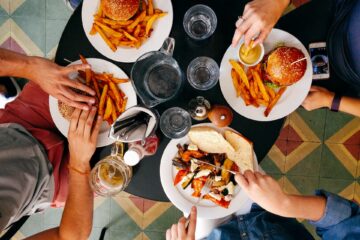Welcome to our article on how much weight shrimp loses when cooked. If you’re a fan of shrimp, you might have noticed that the weight of shrimp changes after cooking. But have you ever wondered how much weight shrimp loses when cooked? Knowing the weight loss of shrimp when cooked is important for recipes that require precise measurements. In this article, we’ll explore the factors that affect shrimp weight loss during cooking, how much weight shrimp loses when cooked, and tips for minimizing weight loss. Let’s dive in!
What is Shrimp?
Shrimp is a popular seafood that is consumed worldwide. Shrimp are small, decapod crustaceans that belong to the family of Palaemonidae. There are over 300 different species of shrimp, varying in size, color, and taste. Shrimp are a low-calorie, high-protein food that contains essential nutrients like selenium, vitamin B12, and omega-3 fatty acids. They are also a good source of antioxidants that may help reduce inflammation in the body. Shrimp are typically sold fresh or frozen, and they can be cooked in a variety of ways, such as boiling, grilling, or sautéing. Shrimp are a versatile ingredient that can be used in a variety of recipes, including salads, pastas, and stir-fries.
Understanding Shrimp Weight Loss
Shrimp weight loss during cooking is a natural process that occurs due to a variety of factors. The amount of weight shrimp loses when cooked depends on factors such as the cooking method, the size of the shrimp, and the freshness of the shrimp.
One factor that affects shrimp weight loss is the cooking method. Shrimp can be cooked in a variety of ways, including boiling, grilling, and sautéing. Boiling shrimp causes the most weight loss because the shrimp are submerged in water, which can cause them to lose some of their natural moisture. On the other hand, grilling and sautéing shrimp can cause less weight loss because the shrimp are cooked in dry heat.
Another factor that affects shrimp weight loss is the size of the shrimp. Larger shrimp tend to lose more weight than smaller shrimp during cooking because they have more water content.
Lastly, the freshness of the shrimp can also affect weight loss during cooking. Fresh shrimp that have not been frozen tend to lose less weight during cooking than frozen shrimp because they have more moisture content.
It’s important to keep in mind that while some weight loss is natural during cooking, excessive weight loss can result in dry and tough shrimp.
How Much Weight Does Shrimp Lose When Cooked?
The amount of weight shrimp loses when cooked can vary depending on several factors, including the cooking method, shrimp size, and freshness. On average, shrimp can lose anywhere from 10-25% of their pre-cooked weight.
If boiled, shrimp can lose up to 25% of their weight due to the water they absorb during cooking. Grilled or sautéed shrimp can lose anywhere from 10-15% of their weight because they are cooked in dry heat.
In terms of shrimp size, larger shrimp tend to lose more weight than smaller shrimp during cooking. For example, jumbo shrimp may lose around 20-25% of their weight, while medium-sized shrimp may only lose 10-15%.
The freshness of the shrimp also plays a role in weight loss during cooking. Fresh shrimp that have not been previously frozen tend to lose less weight during cooking than frozen shrimp, which can lose more water content during the freezing process.
It’s important to note that while some weight loss is natural during cooking, excessive weight loss can result in dry and tough shrimp. Therefore, it’s essential to monitor the cooking process carefully and not overcook the shrimp to minimize weight loss and ensure a delicious, tender, and juicy outcome.
Tips for Minimizing Shrimp Weight Loss
Here are some tips for minimizing shrimp weight loss while cooking:
- Cook the shrimp at lower temperatures: Cooking shrimp at high temperatures can cause them to lose more water and weight. To minimize weight loss, try cooking them at lower temperatures and for shorter periods.
- Use the right cooking method: Different cooking methods have different effects on shrimp weight loss. Grilling, broiling, and pan-frying can cause more weight loss than boiling or steaming. If you want to minimize weight loss, consider boiling or steaming the shrimp instead.
- Do not overcook the shrimp: Overcooking the shrimp can cause them to become tough and lose more weight. Cook them just until they turn pink and opaque, and then remove them from the heat.
- Use brine: Soaking the shrimp in a brine solution before cooking can help them retain more moisture and minimize weight loss. To make a brine solution, dissolve salt and sugar in water and then soak the shrimp in the solution for 30 minutes before cooking.
- Cook the shrimp with their shells on: Cooking the shrimp with their shells on can help them retain more moisture and minimize weight loss. The shells act as a barrier, protecting the shrimp from losing too much moisture during cooking.
By following these tips, you can minimize the weight loss of shrimp while cooking and ensure that they remain juicy and delicious.
Conclusion
In conclusion, it is natural for shrimp to lose weight during the cooking process. The amount of weight loss can vary depending on factors such as cooking method, cooking time, and the size of the shrimp. However, there are some tips you can follow to minimize weight loss, such as avoiding overcooking, cooking with the shell on, and using gentle cooking methods like steaming or poaching. Ultimately, the most important thing is to cook shrimp until it is safe to eat and to enjoy this delicious seafood in a variety of dishes.





